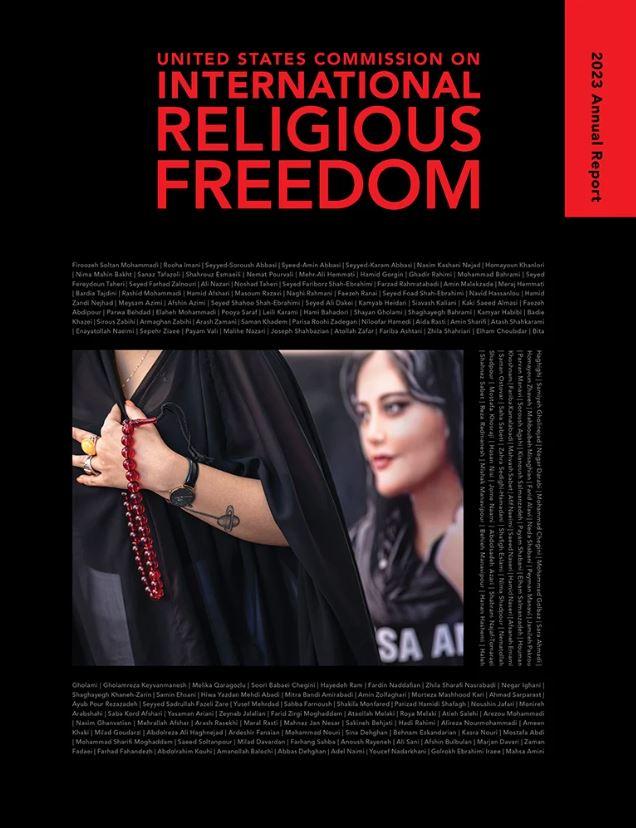Religious Persecution Explained in New Report about Countries with Worst Religious Freedoms
Contributions from FāVS from readers like you make this news story possible. Thank you.
News Story by Cassy Benefield
Religious freedom is priceless to Fereshteh Momeni. An Iranian Baha’i now living in Medical Lake, she lived through the Iranian revolution in 1979 and her country’s transition into the Islamic Republic of Iran.
Because of what she went through as a Baha’i during her country’s revolution, she knows how governments mistreat their citizens when they don’t practice the accepted religion.
This is why she appreciates the information in the 2023 U.S. Commission on International Religious Freedom (USCIRF) report that identifies countries with the worst religious freedoms.
The report was released on May 1. It designated 17 countries of particular concern (CPCs) — Iran being one of those — and 11 countries to the second-tier special watch list (SWL).
“The best thing in America is that when you’re sitting at home you’re not worried that somebody’s just going to barge into your home and arrest you and grab everything,” Momeni said.
This happened to her brother a year into the revolution. He was taken by the authorities from his home and was eventually tortured and killed while in custody.
He, too, was a Baha’i.
The Reason for this Report
The USCIRF is a government advisory body and oversees international religious freedom with an annual report that gives special recommendations to the president’s administration and to congress.
Rabbi Abraham Cooper vice chairs the commissioners in charge of the report. He spoke on CBN’s Faith Nation on May 1 that violations to religious freedom are increasing threats and tensions worldwide.
“This is a very difficult time for religious freedom all over the globe,” Cooper said on Faith Nation.
Religion News Service, in their story on May 1, wrote that the commission “used its new annual report to call out the Iranian government for targeting women’s rights protestors during demonstrations last year” and its “’decades-long’ campaign against religious minorities.”
Even the cover of this year’s report honors the Iranian women and girls who have faced extreme repercussions to protesting their freedoms in the wake of the death of Mahsa Amini. She was taken by Iranian morality police last fall and beaten for not wearing her hijab properly. She died days later while still in their custody.
“Iranian authorities’ systematic use of sexual and gender-based violence against them represents a purposeful weaponization of religious conceptions of purity, modesty, and gender hierarchy in an effort to shame Iranians out of peacefully asserting their fundamental right to religious freedom,” the USCIRF said in its report.
The report added five other nations to the CPC list: Afghanistan, India, Nigeria, Syria and Vietnam.
Local Organization’s Work with Refugees Fleeing Religious Persecution
Zack Reiber has worked with the refugee minor population for more than six years. He is the program supervisor for the Lutheran Community Services Northwest (LCSNW) Unaccompanied Refugee Minor (URM) Foster Care Program.
The URM Program serves youth from various countries including Eritrea (CPC), Democratic Republic of the Congo, Ghana, Guatemala, Honduras, Venezuela, Bangladesh, Burma (CPC), El Salvador, Afghanistan (CPC) and Mexico.
“I have had the opportunity to hear many of their stories, which have included religious persecution,” Reiber said. “This includes youth that identify as Rohingya and who originate from Burma. This population generally practices Islam and have had to escape Burma due to the persecution by other ethnic and religious parties.”
One of the ways the URM Program helps minors who are fleeing religious persecution is by making sure that feel welcome and safe regardless of ethnicity or religion.
They do this is by connecting youth to religious places of worship. This could be the Spokane Islamic Center or various churches and by connecting them to cultural communities in Spokane.
“By doing this, we are able to help change the stories of these youth,” Reiber said.
At Home in America

Momeni immigrated to the U.S. in 1994, 15 years after Iran’s revolution. She and her husband, also an Iranian Baha’i, met and married in the U.S. They raised two boys in Medical Lake, where she works as a doctor in geriatric psychiatry at Eastern State Hospital.
The Baha’i persecutions Momeni experienced and witnessed in her homeland before she immigrated to America are many.
Still, she said Iranian Baha’is stand strong in their religious convictions.
“What the Baha’i community decided was that whatever they do, we say when we’re asked … that we are Baha’i,” Momeni said. “We don’t hide it. We don’t lie. And we don’t change.”
Reports like the one created by USCIRF work in tandem with one of the major tenets of Momeni’s faith: all people are equal.
“This is not right, to be cruel to human beings,” she continued. “And I think that governments have ways to press and push other governments to observe the rights of their citizens. And I think that it should be done. That’s why I think [the USCIRF report] is important.”













Thanks, Cassy, for this much-needed reporting, I was pleased to hear of the work of Lutheran Community Services Northwest, This organization deserves our support.
Thank you Walter! This was an important piece to write for FAVS.News!
Good article and good reminder about our religious freedom.
Thank you Diane! I agree. I also think it’s important for those who don’t practice a religion as well, and understanding their freedoms, too.